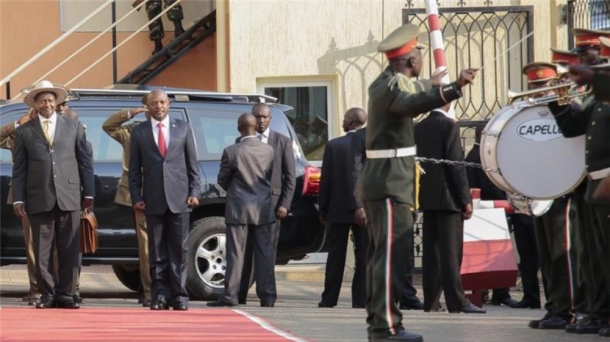
Following the Yom Kippur War in 1973, twenty-nine out of thirty African states broke relations with Israel in a demonstration of solidarity with Egypt. In the half century since, Israel has sought to renew ties throughout Africa, though this process has been rocky at times. At the formation of the African Union (AU) in 2002, for example, Israel’s attempts to gain a seat as an observer were thwarted by a bloc of African states led by Libya’s ruler, Muammar Gaddafi. It remains an important goal of Israel’s Africa policy to gain legitimacy on the continent through a seat at the AU.
In recent years, Israel has launched a charm offensive in several African countries to revive diplomatic, economic, and security ties. In particular, Israel has expended much effort in East Africa, especially Kenya and Uganda. The fruits of this labor can be seen in the recent visit of Kenya President Uhuru Kenyatta to Israel and the upcoming visit of Israeli Prime Minister Benjamin Netanyahu to East Africa in July 2016 that will coincide with the fortieth anniversary of the Entebbe Raid where the prime minister’s brother, Jonathan Netanyahu, died. This short paper looks at the return of Israel to Uganda and Kenya, seeking to answer why Israel is engaging in these East African countries and to look at what lays ahead.
Roots of the modern relationship between Israel, Kenya, and Uganda
The political history between East Africa and the Zionist movement that would form the state of Israel dates to 1903, when the British Empire offered a large parcel of the Mau Plateau to Theodore Herzl, leader of the Zionist Federation. The British proposal for a temporary home for European Jews was a response to ongoing pogroms in Russia against its Jewish subjects. Though some Jewish organizations believed the Jewish diaspora should welcome resettlement in East Africa, the offer was eventually rejected in 1905 by a plurality of groups lead by the World Jewish Organization.
Though East Africa may strike some as an odd choice for Jewish resettlement, a sizeable community of African Jews reside in Uganda. Indeed, the Abayudaya Jews numbered approximately 3,000 when Idi Amin seized power in 1971.
Idi Amin, the PLFP, and the Entebbe Raid
Under Idi Amin’s rule, Uganda’s support for Palestinian independence created tension with Israel, which broke into open hostility with the infamous Entebbe Raid.
In June 1976 a branch of the Popular Front for the Liberation of Palestine (PLFP) hijacked a flight carrying 248 passengers from Tel Aviv to Paris, and redirected the airplane to Entebbe Airport in Uganda.
Idi Amin personally greeted the plane at the airport, and provided the hijackers with logistical and political support. In neighboring Kenya, the government condemned the hijacking and granted access to Israeli warplanes to land at Jomo Kenyatta Airport to execute what was later known as the Entebbe Raid. Following a stand-off that lasted several days, Israeli commandos launched an operation that ended the stand-off and managed to rescue all but three hostages. During the attack, Israel lost one of its commanders, Jonathan Netanyahu, brother of the future prime minister of Israel, Benjamin Netanyahu. The decision by the Kenyan government to facilitate the raid infuriated Idi Amin. Subsequently, Amin directed the massacre of thousands of Kenyans living in Uganda along with Abayudaya Jews, whose numbers were reduced to 300. In support of Amin’s position, the Organization of African Unity (OAU) lodged a complaint with the United Nations Security Council charging Israel with violating the sovereignty of an independent state.
Renewing ties
In the wake of the Entebbe Raid—and even after the end of Amin’s rule in 1979—Israel-Ugandan relations remained low and struggled to improve. In recent years, however, relations have warmed as both countries have worked to resuscitate political and diplomatic ties. Israel has been involved in development projects with the community of Abayudaya in Mbale in eastern Uganda, where the population has rebounded to roughly 2,000. There has also been a trickle of Israeli business tours in Uganda, with the intention of exploring investment opportunities. During the visit of Israeli Ambassador to East Africa Gil Haskel, the Ugandan Minister of State for Industry Dr. James Mutende encouraged Israeli businessmen to invest in industry, agricultural processing, and tourism. (1) Israeli companies are also active in Uganda’s infrastructural development and the services industry. And bilateral cooperation currently encompasses agriculture, postharvest technologies, animal husbandry, water management, health, and homeland security. (2)
Across the border in Kenya, Israel has established solid political, economic, and military ties. In 1991 the two countries launched the joint Kibwezi Irrigation Project that continued until 1996 and included an experimental irrigation farm in the Yatta Plateau. Israeli investment continues to grow, and there are now direct flights from Tel Aviv to Nairobi. Among other prominent holdings, an Israeli company owns a stake in the popular Westgate Mall in Nairobi including four popular restaurants inside the mall.
Military cooperation between the states is very close, and Israel has provided training to Kenya’s special operations forces. Kenya opened negotiations with Israel in 2010 to purchase weapons mainly for the purposes of border patrol. These negotiations built the foundation for a treaty on terrorism, money laundering, and other crimes. Israel was the first country to offer assistance during the horrific siege of the Westgate Mall in September 2013 where 72 people were killed and more than 150 injured. According to some observers, the recent rise in terrorism in East Africa has generated a new sense of affinity with Israel.
The ties between Kenya and Israel extend also to medical and humanitarian fields. President Uhuru Kenyatta of Kenya recently embarked on a three-day state visit to Tel Aviv. During that trip he visited the Wolfson Medical Centre in Tel Aviv where more than twenty Kenyan children have received heart surgery, while others are awaiting to be airlifted to the hospital through the Save a Child’s Heart Kenya, an NGO based in Israel. (3)
“Israel is coming back to Africa, and Africa is returning to Israel,” Prime Minister Netanyahu said in remarks welcoming President Kenyatta to Jerusalem in February 2016. A dramatic expression of this deepening alliance is planned for July 2016 when Prime Minister Netanyahu is scheduled to travel to Kenya and Uganda. (4) The visit will coincide with the fortieth anniversary of the Entebbe Raid in Uganda.
Looking ahead: An Israeli seat at the African Union?
Israel has long faced an uphill battle to win friends in Africa. However, its concerted outreach efforts in recent seems to be yielding results as Israel now boasts strong relationships with several countries in East Africa. Despite a large Muslim population in East Africa that has long been hostile toward Israel, there seems to be a general easing of attitudes. In addition to the economic and political ties, the spike in East African terrorism—combined with Israeli security support—is contributing to a new acceptance of Israel as a partner. In what would have been a highly unlikely initiative twenty years ago, a group of ten African ambassadors to the US recently attended a presentation in Washington by an Israeli counter-terrorism expert. (5)
Gaining official status with the African Union would represent an important milestone, yet Israel is still struggling to make inroads into Africa’s most powerful political body. Strong pro-Palestine sympathies—particularly with the AU’s most influential member, South Africa—have hampered the improvement of Israel’s relations with Africa. Many Africans continue to see unmistakable parallels between Israel’s occupation of Palestine and South African apartheid. Growing support for boycotts against Israel is reminiscent of the anti-apartheid boycotts that gained momentum in the second half of the 20th century. (6)
Israel enjoyed observer status at the OAU, the predecessor organization to the AU, until it was dissolved in 2002. Following the AU’s initial rejection of Israel—led by the former Libyan leader Muammar Gaddafi—Israel has been lobbying tirelessly to gain a seat at the AU. (7) Official observer status at the AU is important to Israel as it will enhance the country’s legitimacy on the continent and open doors for further engagement. It is perhaps Israel’s successful engagement with East Africa that will tip the balance in its favor. As terrorism increases throughout East Africa there is growing appreciation for Israel’s security posture. This has presented new political opportunities for Israel in Africa and indeed has raised the chances for Israel to be readmitted into the AU.
_____________________________________
Thembisa Fakude is Head of Research Relations at Al Jazeera Centre for Studies.
1- David Mafabi, “Industry Minister invites Israel investors to Uganda,” Daily Monitor, 29 April 2013, www.monitor.co.ug/Business/Industry-minister-invites-Israeli-investors-to-Uganda/-/688322/1760648/-/14847im/-/index.html
2- Halima Athamani, “Uganda, Israel deepens cooperation,” Anadolu Agency, 6 November 2015, http://aa.com.tr/en/africa/uganda-israel-deepen-cooperation/468457
3- Daily Nation, “Kenya to Benefit from President Uhuru Kenyatta’s visit to Israel,” 27 February 2016, www.nation.co.ke/news/Kenya-to-benefit-from-Uhuru-Israel-visit/-/1056/3094074/-/vdhk81z/-/index.html
4- Kevin Kelley, “Israel on a charm offensive to African countries,” The East African, 13 April 2016, www.theeastafrican.co.ke/news/Israel-on-a-charm-offensive-to-African-countries-/-/2558/3156556/-/imy90k/-/index.html
6- Patrick Bond, “From Apartheid South Africa to Palestine,” TNI, 28 October 2010, www.tni.org/es/node/12515
7- Modi Edwin Kindzeka, “Israel Lobbying for AU Observer Status”, Voice of America, 24 October 2015, www.voanews.com/content/israel-lobbies-for-observer-status-with-the-african-union/3005790.html
